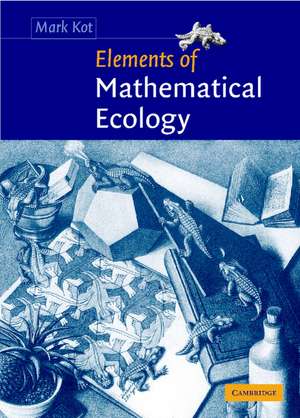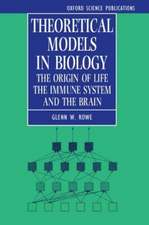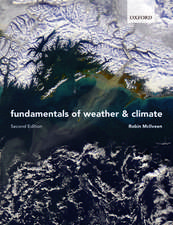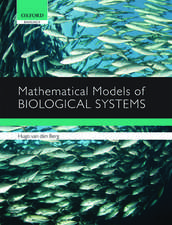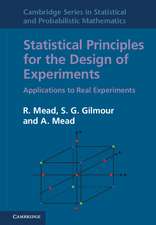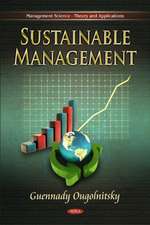Elements of Mathematical Ecology
Autor Mark Koten Limba Engleză Paperback – 18 iul 2001
| Toate formatele și edițiile | Preț | Express |
|---|---|---|
| Paperback (1) | 663.20 lei 43-57 zile | |
| Cambridge University Press – 18 iul 2001 | 663.20 lei 43-57 zile | |
| Hardback (1) | 1178.61 lei 43-57 zile | |
| Cambridge University Press – 18 iul 2001 | 1178.61 lei 43-57 zile |
Preț: 663.20 lei
Preț vechi: 745.17 lei
-11% Nou
Puncte Express: 995
Preț estimativ în valută:
126.91€ • 132.83$ • 105.62£
126.91€ • 132.83$ • 105.62£
Carte tipărită la comandă
Livrare economică 31 martie-14 aprilie
Preluare comenzi: 021 569.72.76
Specificații
ISBN-13: 9780521001502
ISBN-10: 0521001501
Pagini: 464
Ilustrații: 239 b/w illus. 11 tables
Dimensiuni: 170 x 244 x 24 mm
Greutate: 0.74 kg
Ediția:New.
Editura: Cambridge University Press
Colecția Cambridge University Press
Locul publicării:Cambridge, United Kingdom
ISBN-10: 0521001501
Pagini: 464
Ilustrații: 239 b/w illus. 11 tables
Dimensiuni: 170 x 244 x 24 mm
Greutate: 0.74 kg
Ediția:New.
Editura: Cambridge University Press
Colecția Cambridge University Press
Locul publicării:Cambridge, United Kingdom
Cuprins
Preface; Part I. Unstructured Population Models; Section A. Single Species Models: 1. Exponential, logistic and Gompertz growth; 2. Harvest models - bifurcations and breakpoints; 3. Stochastic birth and death processes; 4. Discrete-time models; 5. Delay models; 6. Branching processes; Section B. Interacting Populations: 7. A classical predator-prey model; 8. To cycle or not to cycle; 9. Global bifurcations in predator-prey models; 10. Chemosts models; 11. Discrete-time predator-prey models; 12. Competition models; 13. Mutualism models; Section C. Dynamics of Exploited Populations: 14. Harvest models and optimal control theory; Part II. Structured Population Models; Section D. Spatially-Structured Models: 15. Spatially-structured models; 16. Spatial steady states: linear problems; 17. Spatial steady states: nonlinear problems; 18. Models of spread; Section E. Age-Structured Models: 19. An overview of linear age-structured models; 20. The Lokta integral equation; 21. The difference equation; 22. The Leslie matrix; 23. The McKendrick-von Foerster PDE; 24. Some simple nonlinear models; Section F. Gender-Structured Models: 25. Two-sex models; References; Index.
Recenzii
'Kot's current compilation will prove extremely useful …'. Acta Biotheoretica
'Kot's book fills the need for a rigorous, graduate-level textbook in mathematical population ecology, and does it very well'. Quarterly Review of Biology
'This is a further important book in the field of the theoretical ecology … the volume will prove invaluable to all students of mathematical biology and theoretical ecology.' Folia Geobotanica
'… suitable for a year's course of study for upper level students and beginning researchers in ecology, mathematical biology and applied mathematics. … an excellent introduction to mathematical ecology for the reader with an appropriate mathematical background (calculus, differential equations and probability theory).' Zentralblatt MATH
'Kot's book fills the need for a rigorous, graduate-level textbook in mathematical population ecology, and does it very well'. Quarterly Review of Biology
'This is a further important book in the field of the theoretical ecology … the volume will prove invaluable to all students of mathematical biology and theoretical ecology.' Folia Geobotanica
'… suitable for a year's course of study for upper level students and beginning researchers in ecology, mathematical biology and applied mathematics. … an excellent introduction to mathematical ecology for the reader with an appropriate mathematical background (calculus, differential equations and probability theory).' Zentralblatt MATH
Descriere
An introduction to classical and modern mathematical models, methods, and issues in population ecology.
